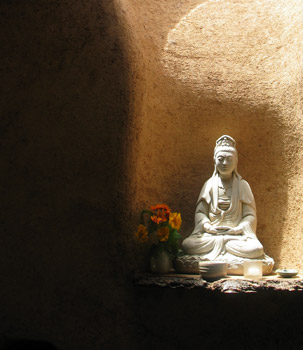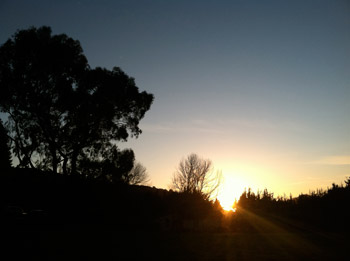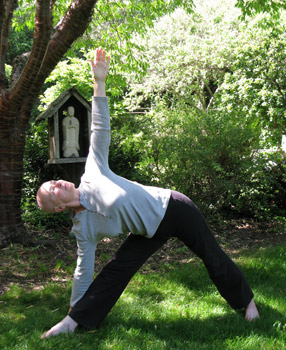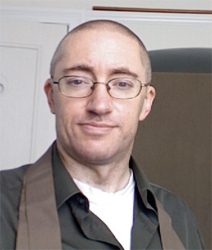An Interview with Shokuchi Carrigan and Ingen Breen (2013)
by Jay Pennington, Sangha News Editor
Balance may not be the first word that pops into mind when you think of the holidays—the often-hectic year’s end, full of socializing, shopping, travel and expectation. But then again, that’s one reason balance might be especially important at this time of year. In the serene setting of Green Gulch Farm, where fertile valley meets beach and ocean, yoga at the solstice offers time to explore the possibilities for balance and what it means for us at all times of the year.
Yoga teacher and Green Gulch resident Shokuchi Carrigan, with Zen teacher and former SFZC resident Ingen Breen, offer a full schedule of Zen and yoga, as well as time to walk and enjoy the natural surroundings. Recently both teachers responded to a few questions, sharing their perspectives on this pivotal time of year.
What is significant about the timing of the retreat? Why do we need a holiday before the holidays?
Shokuchi: This is a time of year when, in many spiritual traditions, one attends to the nurturing of light in the midst of darkness, to warmth when it is cold, and to joy in the middle of life’s ups and downs. It is common in spiritual traditions for practitioners to have a time of solitude and purification before days of spiritual significance. Both yoga and meditation are purifying practices for body and mind, practices which allow each person to spend some time with themselves, even while being part of a group.
And what a wonderful gift to oneself—a refreshment!—to take some time out from the busyness of the holiday season, centered around giving to others, to care for one’s body/mind in retreat.
Ingen: When I first started to practice, it was a delight to have something positive to engage in over the Christmas period and escape what I considered to be the “madness.”
 But what is most significant for me is that it is the weekend of the solstice. Christmas is the Christianization of a pagan feast, the Feast of the Inconquerable Sun, when the sun’s “return” has been evidenced. The solstice on the night of December 21 is the longest night of the year, and there is a sense of entering into the darkness and returning to the light. This retreat neatly spans the solstice; we enter into it approaching the longest night, and we return to the world as the days are beginning to lengthen, the sun beginning to “return”—a time of renewal and symbolic rebirth.
But what is most significant for me is that it is the weekend of the solstice. Christmas is the Christianization of a pagan feast, the Feast of the Inconquerable Sun, when the sun’s “return” has been evidenced. The solstice on the night of December 21 is the longest night of the year, and there is a sense of entering into the darkness and returning to the light. This retreat neatly spans the solstice; we enter into it approaching the longest night, and we return to the world as the days are beginning to lengthen, the sun beginning to “return”—a time of renewal and symbolic rebirth.
Light and dark have almost opposite meanings in Oriental Buddhism compared to our Judeo-Christian inheritance: we enter the darkness in order to bring goodness into the light. The dark is the realm of the absolute, the undifferentiated, and the light is the realm of the relative, the world of things. In the “Harmony of Difference and Equality,” we chant “Light and dark oppose one another like the front and back foot in walking.” Light and dark, heaven and earth, will be a theme of this retreat, with the yogi and the meditator embodying the two.
How will the style of yoga facilitate balancing these opposites? What do you hope people will take away?
Shokuchi: The yoga practices that we will do involve restful asanas, warming and energizing sequences, and grounding, stabilizing postures. I sincerely hope that people will take away what they need. If they feel tired, I hope they will feel rested and energized; if anxious and frazzled, I hope there will be peace and calm; and if sad or depressed, as often happens at this time of year, I hope there is joy and camaraderie in the warmth of group practice.
Ingen, if I recall correctly, you have a lot of experience with bodywork and body practices. What are they, and how do they inform your understanding of yoga, of Zen and of the retreat?
Ingen: When leaving Zen Center I wondered what I would do for a livelihood and thought of massage. This made sense because it was a way of caring for people and, I imagined, conducive to a meditative presence. I was right on these. It also made sense because I had for a long time been involved in various “body practices”: Aikido, T’ai Chi and Yoga—not at all consistently, but enough to know that physical awareness and mental presence are mutually supportive.
I’m looking forward to this retreat as a way of getting back into some physical discipline, as I have neglected this part of my practice over the last few years. The essence of all these practices is being present, and when you are fully present the whole world is there.
The retreat description encourages us to “experience the joy and wonder of balancing mind and body.” Joy and wonder are two words often used around the holidays. Are you deliberately connecting that traditional holiday feeling to this retreat?
Ingen: Balancing the mind and body is always a joy and wonder, or at least it opens us to a sense of wonder. I feel that this sense of wonder, and with it enchantment, is often missing in the hurly-burly of modern life, and its absence can be even more acute in a stressful holiday period. But every now and then it seems to break through and we get glimpses of it. I feel coming on a retreat at this time will make us more open to the joy and wonder of the season as well as that of balancing the mind.
__________
Return to The Mind and Body of Practice: A Zen and Yoga Retreat at the Winter Solstice.














